| Srl | Item |
| 1 |
ID:
100678
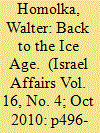

|
|
|
|
|
| Publication |
2010.
|
| Summary/Abstract |
Until well into the twentieth century, Jews and Christians had no mutual basis for discourse. The Christian-Jewish dialogue and the rapprochement between the Holy See and the State of Israel are owed in essence to feelings of shame regarding the Shoah. The Second Vatican Council and the pontificate of John Paul II signified substantial breakthroughs. Since then, though, the sense of guilt has eased, and the Roman Catholic Church's awareness of the injustice of its role as fellow traveller to, and henchman of, the Third Reich has diminished. Under the current Pope, Benedict XVI, the relationship between Jews and Catholics has noticeably deteriorated. After five years of his pontificate, Joseph Ratzinger has lost a great deal of trust, and not only among Jews.
|
|
|
|
|
|
|
|
|
|
|
|
|
|
|
|
| 2 |
ID:
100676
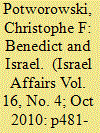

|
|
|
|
|
| Publication |
2010.
|
| Summary/Abstract |
The article explores the possibilities of friendship between Israel and the Pope in the light of Pope Benedict's denial of a reduction of religions to cultural artefacts and his commitment to religious claims to truth. Any discussion of Benedict XVI and Israel must take into account this call for the respect of the human desire for truth, the confidence in the ability of reason, and the validity of religious statements. This article offers some reflections on Benedict XVI's contribution to the larger debate of interreligious dialogue between Christianity and the Jewish faith. After a brief look at Vatican II's Nostra Aetate and at John Paul II, the essay examines some sections of Benedict XVI's Jesus of Nazareth and his first encyclical Deus Caritas est with a view of developing the category of friendship as it applies to his attitude to the faith of Israel.
|
|
|
|
|
|
|
|
|
|
|
|
|
|
|
|
| 3 |
ID:
100688
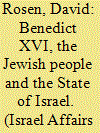

|
|
|
|
|
| Publication |
2010.
|
| Summary/Abstract |
Benedict XVI has had to contend with invidious comparisons to his predecessor from the outset of his pontificate and this has been reflected in Jewish attitudes towards him as well. At the same time a selective loss of memory has occurred in relation to Pope John Paul II. By examining the documents and initiatives of Cardinal Ratzinger, as well as Pope Benedict XVI, this article shows that the idea that Benedict XVI is lacking commitment to the Catholic-Jewish relationship could not be further from the truth.
|
|
|
|
|
|
|
|
|
|
|
|
|
|
|
|
| 4 |
ID:
100675
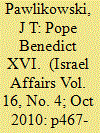

|
|
|
|
|
| Publication |
2010.
|
| Summary/Abstract |
Pope Benedict XVI came to the papacy with a very limited track record in terms of Catholic-Jewish relations generally speaking and virtually no public perspective on political issues related to the ongoing Israeli-Palestinian conflict. Since assuming the papacy he has addressed the Middle East political conflict only on a few occasions save for his trip to the region where he spoke to the question at length throughout his visit to Jordan, Israel and the Palestinian Authority. He was somewhat cautious in his remarks while highlighting several key issues. Pope Benedict affirmed several times during his visit that Christian-Muslim reconciliation was a strongly desired goal on the part of the Vatican. But he also gave his strong endorsement to territorial sovereignty for Israel alongside a Palestinian state. He even implied a direct connection between biblical Israel and the modern state. On numerous occasions he encouraged the local Christian community to stand fast in its faith and not leave the region. For Pope Benedict the continuation of a vibrant Christian community in the Middle East is of the highest priority. The future position of the Pope and the Vatican will no doubt be affected by the reception accorded to the KAIROS Palestine document, the results of the ongoing negotiations between the Holy See and the Israeli government over a host of specific issues such as taxation, clergy permits, etc., the development of a serious peace plan by US President Barack Obama and the conclusions of the Synod on the Middle East in October 2010.
|
|
|
|
|
|
|
|
|
|
|
|
|
|
|
|
| 5 |
ID:
100681
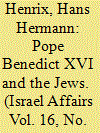

|
|
|
|
|
| Publication |
2010.
|
| Summary/Abstract |
The article deals with the question of whether the view that Benedict's relationship with the Jews needs to be regarded with suspicion is justified. Ratzinger's respective theology is scrutinized. Special attention is given to the contested Good Friday prayer for Jews as well as to the attempt at re-integrating the priests of the Pius X priest community. It cannot be denied that there is suspicion and ambiguity. In Benedict's view the fact that Israel is the foundation of Christian faith has been overshadowed. This firm belief has been expressed in Benedict's book on Jesus of Nazareth, during his visit to Israel in May 2009, and also during his address to the Jewish community in Rome in January 2010. The latter event is of particular importance. Benedict's address of 17 January 2010 can be seen as a central hermeneutical point of reference to understand Benedict's relationship with Judaism and the Jews. It is in the light of this point of reference that moments of suspicion can be counteracted. This does not mean, however, that Catholic-Jewish relations have been without irritations and tensions. But there is space for a constructive way of dealing with these frictions.
|
|
|
|
|
|
|
|
|
|
|
|
|
|
|
|
| 6 |
ID:
100679


|
|
|
|
|
| Publication |
2010.
|
| Summary/Abstract |
During his address on the occasion of his visit to the Synagogue in Rome in January 2010, Pope Benedict spoke of three areas in which Jews and Christians - on the basis of the Ten Commandments - can join forces to transform society: the commitment to make people recognize God and to fight idolatry; the commitment to respect and protect life; and the commitment to preserve and promote the sanctity of the family. Jews and Christians can make use of spiritual and moral resources to involve themselves in these causes - and these areas of concern can be seen as important elements of the spiritual infrastructure that a well ordered society needs. The article describes Pope Benedict's relationship to the State of Israel, Judaism and the Jewish tradition using as key terms the concept of 'moral resources' and the concept of 'spiritual infrastructure'. The main claims are that: Pope Benedict sees a permanent solution to the challenges to peace in Israel in the establishment of a spiritual infrastructure; he considers memory, remembering and remembrance as key moral resources; and, in his view, Christianity cannot develop its moral and spiritual resources without an ethics of memory honouring its Jewish roots.
|
|
|
|
|
|
|
|
|
|
|
|
|
|
|
|